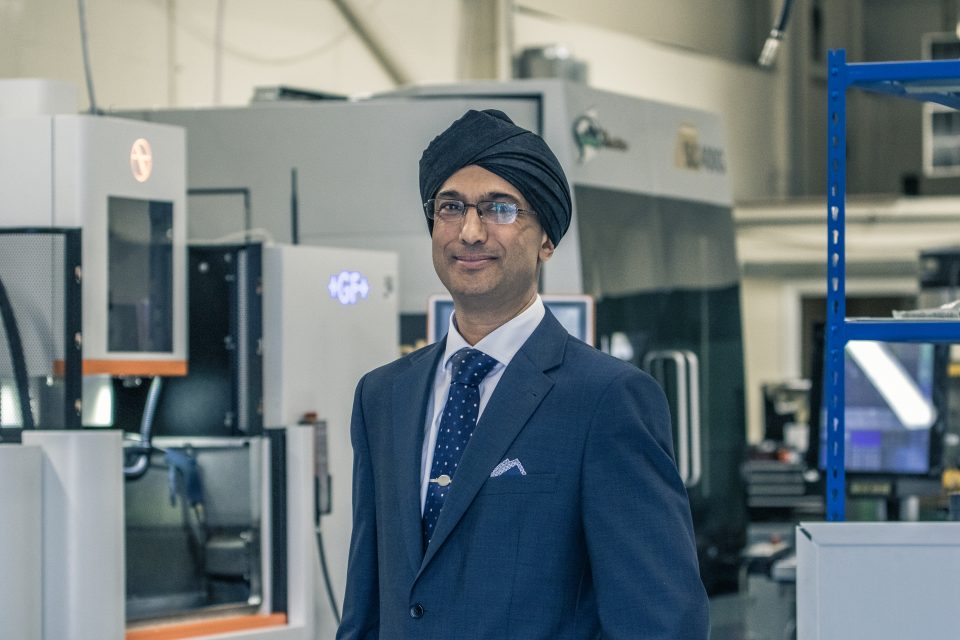Having recently passed its ISO3485 audit – the internationally recognised quality standard for the design, production, installation and servicing of medical devices and related services – and witnessed a new Managing Director appointed, Kirkstall Precision Engineering has its sights firmly set on the future.
The Manufacturer sat down with Iqbal Bahia, Managing Director at Kirkstall, to find out more about the new man at the helm and what we can expect from the precision engineering firm going forward.
TM: How did you get into manufacturing, Iqbal?
I started my manufacturing career in the Kirkstall Valley, only about two or three miles from where I am now. I secured a mechanical apprenticeship in manufacturing at an international Swiss company.
Now I was very fortunate in that the MD basically took me under his wing and fast tracked my progression. Once I’d finished my five-year apprenticeship I went into quality management, where my first task was to implement BS5750 (now ISO9001). Having successfully done that I worked my way up the organisation, from quality engineer to production manager, then production director and supply chain director.
After 30 years it was time for a change. I decided to go out and become a self-employed consultant. In that role I helped set up some significant manufacturing facilities and implement lean business practices and systems as part of their plan to list on the stock market
TM: Then you joined Kirkstall Precision?
Yes. I’d had enough of traveling all the time and living out of a suitcase. I knew Adam [Thornton, now CEO of Kirkstall Precision] and he asked me to come in as a consultant as he’d just taken over the firm. Following more conversations, it was agreed that the role was going to be too much on a consultancy basis, so he offered me the position of Operations Director.
I spent the first two or three years putting the right quality management systems in place, including a new ERP system. Once we had implemented that, we had a new level of data clarity. We were then in a position to move the business forward in a different direction.
TM: And what is that new direction?
Now that we’ve got complete confidence in our data, we are in a much stronger position to deliver against our customers’ needs. We are serving more and more customers as a solutions provider for the medical and veterinary industries. In fact, around 85% of our business now comes from customers in these sectors.
As part of this, we are looking to get more involved with research and development and design so we can offer our customers the additional value-added services they require for these sectors.
We played a significant role in the UK Government’s Ventilator Challenge towards the beginning of the pandemic, manufacturing ventilator parts. We also manufacture a lot of Orthopaedic medical devices, the actual instruments surgeons use to perform surgery, including, recently, a lot more spinal surgery equipment.
Interestingly, we’ve also witnessed significant growth in the veterinary sector. Now whether that’s because more people got pets during the lockdowns, I’m not sure, but we’re seeing a lot of demand for veterinary instrumentation. Items such as implants, surgical equipment and the trays used to hold said equipment during procedures. I also believe one of the reasons why veterinary companies have turned to us is out proven quality standards, demonstrated by our ISO 13485 accreditation.
TM: We understand you’re focusing more on training and development too
IB: Yes! We’re firm believers of investing in our people. As you know, we are currently looking to fill four apprentice roles at the moment. We’ve also taken on our first ever master’s degree engineering graduate, who is focusing on R&D.
Last year, we also recruited a new Quality Assurance Manager, Peter Newbold. Now his background is heavily in the medical devices industry but he’s also an experienced trainer. This mix was perfect for us as it allows us to continue our medical manufacturing work and focus on developing our people.
I firmly believe that if you have the right people, the right processes, and the right procedures — the three Ps as I call them — then you’ve got a solid foundation for success.
TM: So, what is it you love about manufacturing, Iqbal?
I came into manufacturing as an apprentice engineer at the age of 16. But even prior to that, when I was at school, and I’m going back a bit now (I’ll be 54 this year) I always enjoyed metal work. It fascinated me, as did engineers like Isambard Kingdom Brunel. I always had an interest in engineering and saw myself from an early age following a career in industry.
One of the things I love about manufacturing is how you can turn a concept into a reality. Something that’s basically just an idea can be advanced through manufacturing into a finished product.
I realised I had two avenues I could explore: Go to university and study, or actually experience manufacturing via an apprenticeship. As you now know I took the latter route first then focused on my further education after.
TM: How is Kirkstall keeping pace with manufacturing advancements?
We’re getting more involved with 3D printing. It’s an advancement that’s particularly well suited for the medical device market, for example for creating medical implants, and that’s why we’ve invested in 3D printer technology.
We’re also one of only two companies, I believe, that has invested in the very latest EDM (electro-magnetic discharge) technology. A move that I believe will give us a competitive edge when it comes to our USPs that improves efficiency so we can make savings which we’ll ultimately pass on to our customers.
A manufacturing paradigm shift is happening, and we are embracing it.

